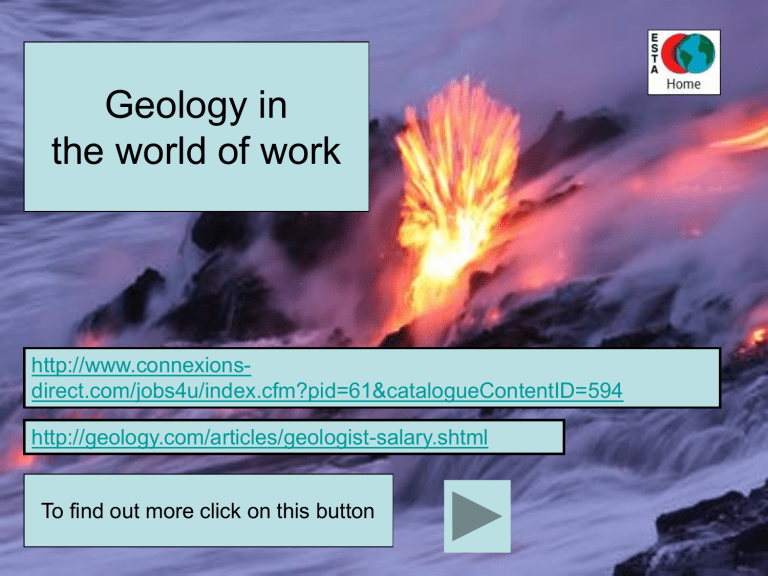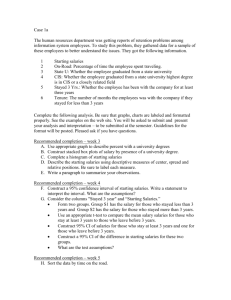Geology & the world of work - Earth Science Teachers' Association
advertisement

Geology in the world of work http://www.connexionsdirect.com/jobs4u/index.cfm?pid=61&catalogueContentID=594 http://geology.com/articles/geologist-salary.shtml To find out more click on this button Geology in the world of work Geology in the world of work To find out more click on this button Volcanologist Volcanologist To see a volcano in action: http://www.volcanogallery.com/volcano_videoclips.htm Volcanologists study volcanoes, particularly with a view to predicting how people may be affected by volcanic activity. Here the volcanologist, measuring the temperature of the lava flow with an optical pyrometer, is employed by the United States Geological Survey. A volcanologist’s job takes you to exciting places like Hawaii, Java and the Andes. At a senior level you can expect to earn up to £40,000 a year. www.usgs.gov/ Tourist guide This tourist guide, working in British Columbia in Canada is leading a group of people on a tour of geological sites that includes a visit to Walcott’s Quarry near Banff. Here the famous soft-bodied fossils in the Burgess Shale were first discovered. Work as a specialist tour guide can provide excellent opportunities for travel to interesting places. http://www.ggwinter.de/bs/bs_e.htm http://www.stga.co.uk/ Jewellery design Starting salaries for new graduates is approximately £15,000. Salaries can rise to £25,000 or more for people with more experience. Many jewellery designers are self-employed or work freelance because this provides opportunities to work on a part-time basis. http://www.prospects.ac.uk/p/types_of_job/jewell ery_designer_job_description.jsp http://www.csm.arts.ac.uk/courses/undergraduate/jewellery-design.htm Forensic Scientist Forensic Scientist A forensic scientist in action This is Professor Tony Brown of the University of Exeter. Tony has used forensic analyses of pollen samples to link mass graves in Bosnia and made a contribution to the investigation of war crimes in Bosnia. Most forensic scientists work for government agencies. This type of work is available in various places around the world. Salaries of trainee forensic scientists are in the region of £16,000-£18,000, but senior forensic scientists can expect to earn at least £45,000 a year. http://news.bbc.co.uk/1/hi/sci/tech/3640788.stm http://www.geolsoc.org.uk/gsl/groups/specialist/forensic Petroleum Geologist To find out more about the work of a petroleum geologist: http://www.geomore.com/Main_I ndex.html Working as a petroleum geologist provides great opportunities to travel. The average annual salary for petroleum geologists with 3 to 5 years experience rose to £37,500 in 1995. http://www.tips4jobs.co.uk/jobbank/geography/petroleumgeologist-job.php Seismologist Geophysicists/field seismologists use complex equipment to collect data on earthquakes and seismic waves. Their main responsibility is controlling data quality. To do this they monitor displays and may do some initial interpretation. Here a scientist is using just a single seismograph for a smaller scale survey. Starting salaries: £18,000 - £19,000 (with a first degree) or around £22,000 - £23,000 (with a higher degree). Typical salary at senior level (after about six years): £44,000 www.kgs.ku.edu/.../ Equip/Seismograph/Seis2.htm Civil engineering Civil engineering is about creating, improving and protecting our built environment. Civil engineers provide the facilities such as tunnels, bridges, harbours, railways, hospitals, roads and buildings. Starting salaries for civil engineering graduates compare well with other professions. You can expect to be paid between £16,000 £21,000 when you start work, but civil engineering can provide international and managerial opportunities with salaries in the range from £33,000 to £63,000. http://en.wikipedia.org/wiki/Civil_engineering Hydrogeologist Hydrogeologist Hydrogeologist Rosemary Carroll is a hydrogeologist whose work focuses on numeric simulation of hydrologic systems. Hydrogeologists are concerned with deep groundwater. Their work involves studying the quality of groundwater and they try to understand the complexities of groundwater flow. Hydrogeologists develop hydrogeochemical models of water quality evolution and study how contaminants move through the ground. Starting salaries for hydrogeologists are in the range £20,000 - £25,000. At a senior level/with experience (salaries are in the range: £26,500 £48,500. www.dri.edu/ People/rcarroll/ www.geolsoc.org.uk/gsl/null/lang/en/pid/721 Landscape architect This landscape architect is staking trees out having designed the garden landscape so that it is takes Into account the local Geology. Landscape architects can expect to find work almost anywhere in the world and, if they are self-employed, may be able to earn up to £45.000 a year. www.mogulmarketing.com Quarrying To see quarrying in action: http://www.dykon-blasting.com/rock_index.htm The roads, footpaths, bridges and buildings (houses, schools, hospitals & shops) that make up our built environment are made from raw materials extracted from the earth by the quarrying industries. Much of the stone extracted from the ground is crushed to produce aggregate, which may then be separated into the different sizes required for use, or for further processing, such as coating with bitumen to make “tarmac”. The starting salary for a quarry manager is £25,000/year. Managers of large units may earn up to £50,000. Career paths for senior roles in this industry can lead to annual earnings of £100,000+. http://www.ypte.org.uk/environmental/quarrying-and-mineral-extraction/79 http://www.virtualquarry.co.uk/ Archaeologist Although most archaeologists are employed in the private sector as contractors, other forms of employment are in museums, local government, as academic archaeologists or with national bodies such as English Heritage. The starting salary for a digger as a site assistant is £13,700 – £15,500 (salary data July 07). Salary at more senior levels with experience (e.g. after 10-15 years in the role) depends upon the post held and the employer. www.britarch.ac.uk/ www.arch.soton.ac.uk Your pay depends on where you work; university academics and archaeologists working for national bodies tend to earn more. Natural hazard risk management To see natural hazards in action: www.ultimatechase.com/hurricane_video.htm Natural hazards include landslides, flooding, earthquakes, volcanic eruptions, coastal erosion, storm surges and tsunamis. Natural hazard risk reduction includes modifying natural events, determining the risks posed by the events and assessing the possible outcomes of their impact. Graduates working in this area as geo-hazards risk assessment experts or consultants can expect to earn between £60,000 & £100,000/year. www.esa.int/esaLP/ SEM2GH0DU8E_LPgmes_3.html Teaching This is Professor Jim Marshall teaching and leading a university field class in Pembrokeshire. Science subjects are in demand in secondary schools. If you choose to train to teach science you can get additional support and funding. Teaching is a rewarding profession, offering a variety of career prospects and development opportunities. As a qualified teacher you will receive a salary comparable to many other leading professions. www.tda.gov.uk/ www.liv.ac.uk/earth/ugrad/fieldwork/FieldworkSites.htm Research worker This is Professor Jane Francis carrying out research at the Leeds Centre for Polar Research. Research work is usually carried out by a graduate who has already gained a higher degree and is keen to specialise in a particular branch of geology and work on a longer term project. As a research worker you will be involved in testing and developing concepts contained within a research problem. You may do this by collecting and analysing data, developing experiments or conducting numerical studies. Eventually you will develop your own conclusions on the research problem. Research work is stimulating and challenging, but it can provide opportunities to visit some unusual places on our planet. http://www.see.leeds.ac.uk/research/igs/seddies/francis/ Waste disposal We need waste disposal sites to dispose of rubbish that cannot be reused or recycled. Geoscientists working in waste disposal identify suitable landfill sites - areas where rubbish can either be deposited directly on the ground (landraising) or dumped to fill unwanted holes in the ground (landfilling). There are specialist postgraduate courses dealing with waste management. The range of typical salaries after 10-15 years’ experience is £23,000 - £31,500 for graduates. www.ace.mmu.ac.uk/eae/Sustainability/Older/Waste_Disposal.html Geotechnical engineering Geotechnical engineers work to ensure slopes, embankments and cuttings are stable. They design and construct foundations for buildings, roads and railways and design safe retaining walls and tunnels. Work as a geotechnical engineer is available in various places around the world. Salaries range from £25,000 to £40,000 a year. http://en.wikipedia.org/wiki/Geotechnical_engineering Hazard mapping Topisdn.ram Avalanches are one type of hazard mapped by a scientist working in this field. To see avalanche hazards in action: http://www.pbs.org/wgbh/nova/aval anche/capture.html Landscape hazard mapping projects may also include: •identifying fault scarps reactivated by recent faulting or earthquakes to work out where to site a new road or railway •producing maps of landslide hazard and flood risk. Average salaries in most ranks of the profession are probably in the £50,000 to £60,000 range. Salaries in senior positions could go considerably higher. http://online.selkirk.bc.ca/rrs/rfw/257/course_outline.htm Stonemason In Gloucester a team of stonemasons is employed to repair the fabric of the Cathedral and to create new artwork. Working as a stone mason you could earn up to £30,000 a year. www.connexionsdirect.com/jobs4u/jobfamily/buildingandconstruction/st onemason.cfm?id=364 www.livinggloucester.co.uk/. ../the_stonemasons Geology in the world of work Part 2 Mining engineer This is Hannah Wenke who graduated from mining engineering in 2005 and now works as an engineer in New South Wales Mining engineers deal with the safe, economic and environmentally responsible recovery of mineral resources from the Earth. No two days as a mining engineer are ever the same. Work may involve: •advanced computer aided design •mine planning •technical work setting off blasts with the shotfiring crew. There are plenty of opportunities to travel and work around the world. Salaries are in the £24,000 to £52,000 range. http://www.uec.ac.uk/mined http://www.iom3.org/ Expedition leader Expedition leaders take people on trips to exotic places such as Antarctica and the Galapagos Islands, or more locally, around the wilds of the UK. People from many different science backgrounds find themselves in this career, but one of the most common degrees is geology. Most work as an expedition leader is contract based, but it does provide an excellent opportunity for travel to unusual places. http://www.quarkexpeditions.com/expedteam/index.shtml www.polarstarexpeditions.com Cartographer A cartographer is involved with the scientific, technological and artistic aspects of developing and producing maps and map information. A cartographer’s job can vary widely. Work activities may involve: •designing maps, graphics, illustrations and layouts, •communicating information through the use of colour, symbols, & style, •using computers to produce graphs for people. In May 2006, annual earnings of cartographers ranged from £19,500 to £50,000. The middle 50 percent earned between £23,500 & £39,000. http://www.prospects.ac.uk/p/types_of_job/cartographer_job_description.jsp http://en.wikipedia.org/wiki/Cartography Flood management To see a flood in action: http://www.reuters.com/news/video/videoStory?videoId=5770 About 5 million people live in flood-risk areas just in England & Wales. Flood management involves protecting people and the environment. can be a challenging and rewarding career. It can be a challenging and rewarding career & work may involve: • Investigating causes of flooding • Assessing the risks associated with flooding • Examining the impact of climate change on flooding patterns • Modelling water resources systems There are opportunities for work throughout the world. Salaries for flood management project leaders are in the range £30,000 to £40,000. http://www.environment-agency.gov.uk/subjects/flood/floodwarning/ Museum worker Trevor Price - a community learning officer at Dinosaur Isle. He looks after the education side of things at the museum & maintains the museum website, but does some of the engineering work! http://www.dinosaurisle.com/default.aspx Museums provide a bridge between science & public education and specialise in developing exhibits designed to stimulate the imagination. Museum work could involve working in the museum education service, working in conservation services or working as a museum curator. Curators in geology are trained in the care & organisation of specimens in museum collections, but usually work as part of a team developing public exhibition galleries. Salaries in this sector are in the range £25,000 to £32,000. http://www.earth.uwaterloo.ca/services/geoscience/miller.html www.museumsassociation.org/ Media Devin Dennie, who trained as a geologist and Todd Kent, a film maker, have teamed up to produce GeoAmerica a travel show that focuses on “Earth science”. David Attenborough Studied studied geology and zoology at university and obtained a degree in Natural Sciences David’s TV documentary work as writer and presenter includes: the "Life" series: Life on Earth (1979), The Living Planet (1984) & The Trials of Life (1990). They were followed by: Life in the Freezer (1993), The Private Life of Plants (1995), The Life of Birds (1998), The Life of Mammals (2002), Life in the Undergrowth (2005) & Life in Cold Blood (2008). Work as a film maker or photographer, concentrating on geological topics, is available in a wide range of places around the world. There are opportunities to use your images & skills in the development of educational resources. As a graduate you can expect to earn a starting salary in the range £25,000 to £30,000. http://www.open2.net/naturalhistory/toolkit.html http://www.khake.com/page45.html http://www.skillset.org/photo/index_1.asp GIS mapping & modelling Stuart Blankenship is a GIS manager based in Virginia. Geographic Information System (GIS) is a computer based information system used to digitally represent and analyse the geographic features present on the Earth' surface. http://www.geospatialcareers.net/people/blankenship.html Geoinformation science includes surveying, spatial analysis, geostatistics, geographic information systems, cartography and visualisation. This inter-disciplinary subject is a developing science in an expanding and changing market. GIS managers can expect salaries in the range £20,000 to £40,000. http://erg.usgs.gov/isb/pubs/gis_poster/ Geothermal energy resources Geologists explore volcanic regions to find the most areas, like this steaming hillside in El Hoyo, Nicaragua, where there could be a source of geothermal energy that could be developed. To see how a geothermal power plant works: http://www1.eere.energy.gov/geothermal/powerplants.html Geologists explore volcanic regions to find the most likely areas for further study, like this steaming hillside in El Hoyo, Nicaragua. To develop hot water reservoirs the geothermal industry employs geologists, geochemists, geophysicists, hydrologists, reservoir engineers, mud loggers, hydraulic engineers and drillers. Salaries for people working in this energy sector are in the range £35,000 to 55,000. http://en.wikipedia.org/wiki/Geothermal_power http://www.earthworks-jobs.com/renewable.html Environmental Impact Assessment (EIA) In EIA work you apply an understanding of different aspects of the environment based on firm scientific foundations. Work is varied. Examples of the types of project you could work on include: •recycling schemes •impacts of road building proposals on wild life habitats •impacts on migratory fish of dams on rivers Career prospects are excellent. You can expect to earn £30,000 to £45,000 a year. http://www.iema.net/jobs Astronaut This is James Reilly. He originally studied for a degree in geosciences and later gained a Doctorate in geosciences. A career as an astronaut provides opportunities to travel to places that are out of this world. Salaries for civilian astronaut candidates are in the range £28,000 to £52,500. http://www.jsc.nasa.gov/Bios/htmlbios/reilly.html http://www.nasajobs.nasa.gov/astronauts/ Science writer http://www.agu.org/inside/awards/bios/witze_alexandra.htm This is Alexandra Witze who gained her first degree in geology and then went on study for a further degree in journalism. Alexandra writes about the physical sciences, including the Earth sciences. In 2000 she was awarded the Walter Sullivan Award for Excellence in Science Journalism http://www.geotimes.org/feb01/offbeatenpath.html http://www.absw.org.uk/So_you_want_to_be_a_science_writer.htm A training in geology can give you a head start in: •untangling the jargon of scientific papers •understanding the significance of developments in different fields Senior science writers can expect to earn to £35,000 or more. There are good opportunities to travel. http://www.aimhigher.ac.uk/careers___guidance/care er_profiles/view_career_profile.cfm?jcode=609 Geological surveying and mapping This work is mapping where rocks on the Earth's surface are found. It involves looking at how rocks are: • folded & fractured • altered by geological processes • dated. Geological maps and databases are basic tools underpinning the use of Earth’s resources. The work is both indoors (in laboratories and offices) and outdoors (on land or at sea). Working hours and conditions vary considerably and many geologists spend time away from home. Salaries range from around £17,500 to £50,000 a year. http://www.connexionsdirect.com/jobs4u/index.cfm?pid=61&catalogueContentID=594 Hydrologist Hydrologists study the quantity, quality and movement of water on or near the surface of the land. Work may include: •measuring, monitoring and analysing water data •assessing water quality •researching water usage. Many hydrologists are office based, although they spend some time out on site. Salaries range from about £14,000 to £20,000 for new entrants to around £45,000 for the most senior hydrologists http://www.hydrology.org.uk/ Environmental Law This area of work focuses on the legal rules that regulate pollution and otherwise protect the environment. Work also deals with public international law in regulating environmentally harmful activities. Average salaries for people working in environmental law are in the range £31,500. Working in the public sector is more profitable than in the private sector. http://www.geotimes.org/feb01/ Land remediation People working on land remediation prevent chemically contaminated land from harming the environment and help to restore property to a safe and usable condition. This type of work will become increasingly vital as: •landfill costs increase; •hazardous waste treatment and disposal costs increase; •solutions to more difficult sites are needed. Salaries in the range up to £45,000 for remediation consultants. http://www.dti.gov.uk/files/file14980.pdf Carbon sequestration Carbon sequestration is a geoengineering technique for the long-term storage of carbon dioxide or other forms of carbon, to try to reduce global warming. Forest ecosystems make an important contribution to the global carbon budget. This is because of their potential to sequester carbon in wood and soil. With correct management, tree planting can result in carbon sequestration. Carbon sequestration is a new technology being developed to reduce greenhouse gas emissions by: •removing carbon dioxide from power plants •storing the carbon in geological structures deep below the ground or sea floor. This industry is looking for selfmotivated people able to work independently on research. http://www.co2storage.org.uk/ There are job opportunities around the world. Salaries are in the range £25,000 to £50,000. http://climatex.org/articles/climate-change-info/carbon-sequestration/ http://www.geotimes.org/mar03/feature_demonstrating.html Sustainability Sustainability is the ability to meet present needs without compromising those of future generations. Working in this field you may face the task of distinguishing which activities are destructive and which are beneficial. Starting salaries are in the range £18,000 to £23,000 and rise to £38,000 for those working in charge of larger projects. There is scope to work in different places around the world. http://www.earthinstitute.columbia.edu/audio_slideshows/mutter_030206/ind ex.html http://www.sustainable-development.gov.uk/ http://www.earthinstitute.columbia.edu/sus_dev/ Conservation Geological conservationists work to preserve the natural geological and geomorphological features in our landscapes and liaise closely with other conservationists to protect the diverse range of habitats and natural resources produced in the different geological environments. The spectacular scenery preserved along coastlines like the Dorset heritage coast also attracts visitors and helps to sustain local tourist industries. You can expect to work in some interesting areas of the world. As a conservation officer you are likely to earn a salary in the range £26,500 - £29,000. www.jurassiccoast.com/321/category/conservation-190.html http://www.naturalengland.org.uk/ Soil scientist Soil scientists collect, interpret and evaluate information about the chemistry, biology and physics of soils. Soil scientists work in: • the public & private sectors, • research for public and private sector institutions, • consultancy, • overseas development, They also help with: • forensics, • archaeological excavations, • conservation, • site reclamation and remediation and • landscape design. The range of salaries with experience (e.g. after 10 to 15 years in the role): £23,000 - £45,000 (salary data collected Oct 2007). http://www.prospects.ac.uk/downloads/occ profiles/profile_pdfs/S1_Soil_scientist.pdf






